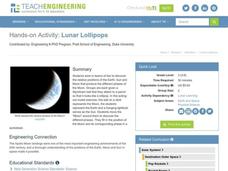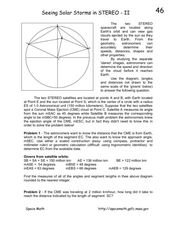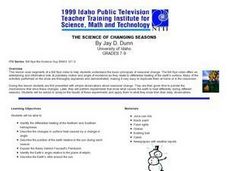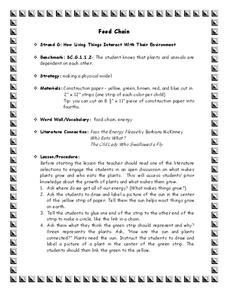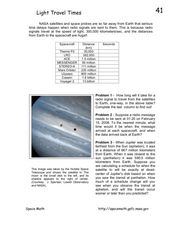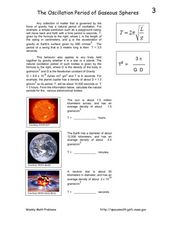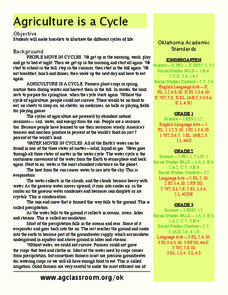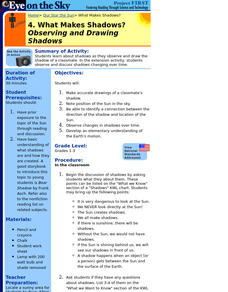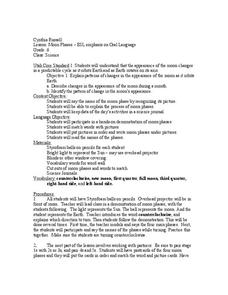Curated OER
Lunar Lollipops
Students work with a partner, Styrofoam ball and light source to simulate the positions of the Earth, Moon and Sun at various stages during the phases of the Moon. They describe why the Moon is visible from Earth and complete a worksheet.
Curated OER
Astronomy with a Stick
Students describe the movement of the Earth as it relates to the sun and
formulate a hypothesis for the movement and the changing length of the shadow. They express the relationship between the sun and the Earth and how that causes the...
Curated OER
The Last Total Solar Eclipse...Ever!
In this total solar eclipse worksheet, students solve 7 problems about the angular size of the moon, the distance the sun and moon should be to match in diameter, the number of years it will take for the moon to be at a certain distance...
Curated OER
Reasons for Seasons
Learners model the tilt of the Earth as it orbits the Sun. They explain the meaning and characteristics of solstices and equinoxes. They explain that sunlight hits the Earth at different angles at different locations over the course of...
Curated OER
Cut and Paste Moon Phases Activity
In this phases of the moon worksheet, students are given pictures of the phases of the moon and they cut them out and paste them to a diagram with the names of the phases. They answer questions about the moon, the phases and the rotation...
Curated OER
An application of the Parallax Effect
For this parallax effect worksheet, students observe 2 photographs taken of an active area of the sun by 2 STEREO satellites and 1 photograph taken of the same active area of the sun by the SOHO satellite. Students observe the shift in...
Curated OER
Seeing Solar Storms in STEREO-II
In this solar storms activity, students use a diagram given the location of two STEREO spacecraft satellites, a coronal mass ejection, the sun and the Earth to solve 2 problems about the coronal mass ejection. Students use segments,...
Curated OER
Evaporation Introductory Lesson
Fourth graders examine the concepts of evaporation and the water cycle. They describe the relationship between heat energy, evaporation and condensation of water on Earth and identify the sun as the source of energy that evaporates...
Curated OER
Solar Storm Timeline
For this solar storm timeline, students read about a series of events that took place in space beginning with a solar flare. Students gather the information and create a time line of events mentioned. They determine the length of time it...
Curated OER
Magnetic Energy
In this magnetic energy worksheet, students are given the formula to calculate the magnetic energy of an object. They use the formula to solve for the magnetic energy of the Earth, a geotail, the Sun, and a solar prominence given their...
Curated OER
Spinning in Circles
In this secondary mathematics worksheet, students determine the speed at which we travel a circle around the axis of the earth and around the sun. The one page worksheet contains one problem. A solution is provided.
Curated OER
The Science of Changing Seasons
Students explore basic principles of seasonal change, ponder the mechanisms that drive these changes, and perform experiments that show what causes the earth to heat differently during different seasons.
Curated OER
Demonstrating the Distances of Stars
Students examine the distance from Earth to stars. They create a model to show the arrangement of constellations. They also identify the importance of the parallax effect.
Curated OER
Me and My Shadow
Students apply the process of scientific inquiries or technological design to explore the explanations of the daily patterns of the Earth's rotation. They record different shadow lengths showing the apparent movement of the sun through...
Curated OER
Food Chain
Students discuss what makes plants grow and who eats the plants. They are asked where do we get all of our energy? Students are asked to draw and label a picture of the sun in the center of the yellow strip of paper. They are explained...
Curated OER
Atmospheric Processes - Radiation
Students investigate how different surfaces absorb heat, and how the physical characteristics of a surface have a powerful effect on the way a surface absorbs and releases heat from the sun.
Curated OER
The Plasmasphere
In this plasmasphere worksheet, students read about the dilute region of gases 10,000 kilometers above the Earth where atoms are ionized. Students use a photograph taken by the IMAGE EUV instrument to answer 3 questions about the...
Curated OER
Planets in Proportion
Students apply estimation strategies and proportional reasoning to determine a scale comparing the planetary bodies to Earth. They convert measurements of time and distance using scientific notation. Both the metric and customary units...
Curated OER
Light Travel Times
In this travel time of light worksheet, learners read about the NASA satellites and space probes that transmit radio signals at the speed of light across huge distances. Students solve 3 problems about data transmission from space to...
Curated OER
The Oscillation Period of Gaseous Spheres
In this oscillation period worksheet, learners read about how the force of gravity effects the oscillation of bodies. Students use two given formulas to identify the oscillation period of the sun, the Earth and a neutron star.
Curated OER
Agriculture is a Cycle
Students explore cycles in nature. In this cross curriculum agriculture activity, students define "cycle" and research weather and planting folklore. Students make a bracelet in which individual colored beads represent the many "cycles"...
Curated OER
What Makes Shadows? Observing and Drawing Shadows
Young scholars make accurate drawings of a classmate's shadow. They note position of the sun in the sky. They identify a connection between the direction of the shadow and the location of the sun. They observe changes in shadows over time.
Curated OER
SDO: Measuring the Speed of an Eruptive Prominence
In this eruptive prominence worksheet, students read about a plasma ejection from the sun measured by the Solar Dynamics Observatory. Students solve 3 problems using the given diagrams of the ejection. They determine the scale of the...
Curated OER
Moon Phases
Sixth graders investigate the phases of the moon. In this moon phase lesson, 6th graders discover that the moon changes in a cycle as it orbits Earth. Students label pictures of moon phases and keep a moon phase journal. Students work in...
Other popular searches
- Earth Moon Sun System
- Sun and Earth
- Earth Sun and Moon
- Earth/sun/moon
- Sun Moon Earth
- Earth, Sun and Moon
- Sun and Earth Kindergarten
- Sun and Earth Orientation
- Rubric Sun Moon Earth
- The Sun and Earth


